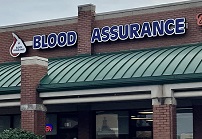July 14, 2022–9:07 a.m.
BLOOD ASSURANCE

Northwest Georgia’s blood supply is in dire need of replenishment, according to Blood Assurance.
On Wednesday, the nonprofit had just 19 units of the universal blood type, O-negative, on its shelves.
Blood Assurance likes to have at least 180 units of O-negative available every day to send to local hospitals.
Additionally, the organization reported low inventory numbers related to O-positive, A-
positive and A-negative blood types.
The summer months often prove to be most difficult for Blood Assurance and other blood banks across
the nation.
“Schools are out and lots of people are vacationing and enjoying time with their families,” said Christopher Swafford, chief operating officer for Blood Assurance. “Donating blood isn’t something folks
are thinking about doing right now, but based on our current numbers, if there was ever a time to
donate, that time is now. Lives are at risk when there’s no blood available.”
Swafford also believes that the recent rise in COVID-19 cases is contributing to the lack of donations.
“The turnout at many of our mobile blood drives, whether at a business or congregation, has been less
than stellar,” he said. “Based on our conversations with staff, we know a lot of people are at home
battling the illness.”
To combat the low supply, Blood Assurance is offering all individuals who donate through July 15 their
choice of a $20 Amazon or Mastercard gift card. More summer incentives will be announced on the
Blood Assurance website, www.bloodassurance.org, in the days and weeks to come.
Donors can visit www.bloodassurance.org/schedule, call 800-962-0628, or text BAGIVE to 999777, to
schedule an appointment. Walk-ins will be accepted.
To be eligible to donate blood, you must be at least 17 years old (16 years old with parental consent),
weigh 110 pounds or more and be in good health.
Donors are asked to drink plenty of fluids — avoiding caffeine — and eat a meal that is rich in iron prior to donating.